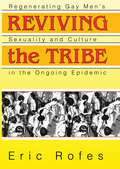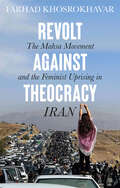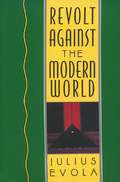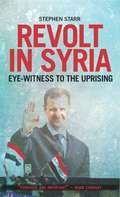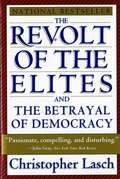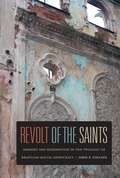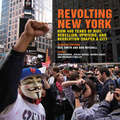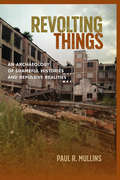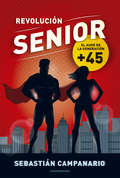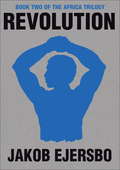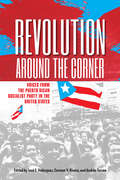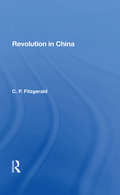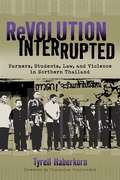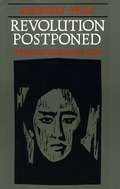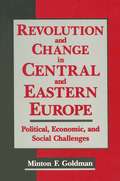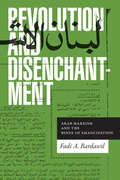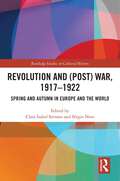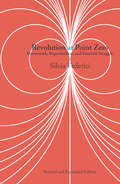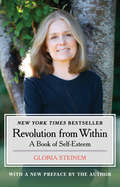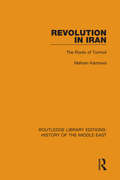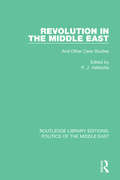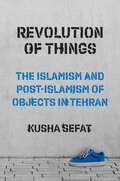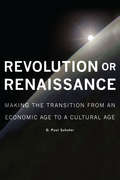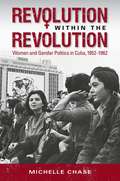- Table View
- List View
Reviving the Tribe: Regenerating Gay Men's Sexuality and Culture in the Ongoing Epidemic
by Eric RofesReviving the Tribe creates a rich and brutally honest portrait of contemporary gay men’s lives amidst the seemingly endless AIDS epidemic and offers both autobiographical self-examination and a relentless critique of current sexual politics within the gay community. Fearlessly confronting the horrors experiences by surviving gay men without giving way to hopelessness, denial, or blame, Reviving the Tribe offers an inspiring blueprint for the gay community which faces a continuing spiral of disaster.In Reviving the Tribe, Author Eric Rofes argues that a return to the interrupted agenda of gay liberation may provide long-term motivation to keep gay men alive and spur rejuvenation of new generations of gay culture. By interweaving social history, psychology, anthropology, epidemiology, sociology, feminist theory, and sexology with his own journey through the epidemic, Rofes provides a moving and compelling argument for stepping out of the “state of emergency” and embracing a life beyond disease. He boldly offers a plan for community regeneration focused on restoring mental health, reclaiming sexuality, and mending the social fabric of communal gay life. Rofes asks unspoken questions lurking in gay men&’s minds and suggests answers to these questions, hitting such controversial topics as: gay men&’s sex cultures of the 1970s why “educated” gay men continue to become HIV-infected changing forms of gay masculinity the opening of new sex clubs and bathhouses leaving “rage activism” behind links between the Holocaust and AIDS unacknowledged roots in the feminist movement of gay men’s AIDS response mass denial of chronic trauma among gay menThe refusal to confront the ever-intensifying manifestations of AIDS has seriously endangered the foundation of contemporary gay communities. Rofes argues that many gay men suffer from the ”disaster syndrome,” a psychologically determined response that defends individuals against being overwhelmed by traumatic experience. In Reviving the Tribe, he provides a radical critique of contemporary gay political culture and suggests alternatives which offer the opportunity to face history, grapple with decimation, and regenerate communal life.Cautioning that an honest analysis of recent gay history and urban cultures promises neither to stop gay men’s suffering nor to end continuing HIV infections, Reviving the Tribe provides gay men with a clear lens through which they might scrutinize their lives, come to a new understanding of the epidemic’s impact on their generation, and redirect activism. This courageous and inspiring work brings Rofes’commanding intellect and twenty years of grassroots gay activism to bear on the challenging task of reconstructing gay life in the new mellennium. Reviving the Tribe is filled with insight of special interest to gay men, lesbians involved in the mixed lesbian/gay movement, sociologists, public health workers, psychologists, counselors, sex educators, religious leaders, and AIDS prevention policymakers searching for fresh vision.
Revolt Against Theocracy: The Mahsa Movement and the Feminist Uprising in Iran
by Farhad KhosrokhavarThis book is the first in-depth account of the uprising in Iran that began on 16 September 2022, when a young woman, Mahsa Amini, was killed by the morality police. In the months that followed, protests and demonstrations erupted across Iran, representing the most serious challenge to the Iranian regime in decades. Women have played a key role in these protests, refusing to wear a hijab and cutting their hair in public to chants of ‘Woman, Life, Freedom’. In Farhad Khosrokhavar’s account, these protests represent the first truly feminist movement in Iran, and one of the first in the Muslim world, where women have been in the vanguard. There have been many movements in the Muslim world in which women have taken part, but rarely have women – and especially young women – been the driving force. The Mahsa Movement also championed non-Islamic, secularized values, based on the joy of living, the assertion of bodily freedom and the quest for gender equality and democracy. Khosrokhavar gives a full account of the context of and background to the events triggered by the killing of Mahsa Amini, analyzes the character of the Mahsa Movement and the regime’s repressive response to it, and draws out its broader significance as one of the most significant feminist movements and political uprisings in the Islamic world.
Revolt Against the Modern World: Politics, Religion, and Social Order in the Kali Yuga
by Julius EvolaWith unflinching gaze and uncompromising intensity Julius Evola analyzes the spiritual and cultural malaise at the heart of Western civilization and all that passes for progress in the modern world. As a gadfly, Evola spares no one and nothing in his survey of what we have lost and where we are headed. At turns prophetic and provocative, Revolt against the Modern World outlines a profound metaphysics of history and demonstrates how and why we have lost contact with the transcendent dimension of being. The revolt advocated by Evola does not resemble the familiar protests of either liberals or conservatives. His criticisms are not limited to exposing the mindless nature of consumerism, the march of progress, the rise of technocracy, or the dominance of unalloyed individualism, although these and other subjects come under his scrutiny. Rather, he attempts to trace in space and time the remote causes and processes that have exercised corrosive influence on what he considers to be the higher values, ideals, beliefs, and codes of conduct--the world of Tradition--that are at the foundation of Western civilization and described in the myths and sacred literature of the Indo‑Europeans. Agreeing with the Hindu philosophers that history is the movement of huge cycles and that we are now in the Kali Yuga, the age of dissolution and decadence, Evola finds revolt to be the only logical response for those who oppose the materialism and ritualized meaninglessness of life in the twentieth century. Through a sweeping study of the structures, myths, beliefs, and spiritual traditions of the major Western civilizations, the author compares the characteristics of the modern world with those of traditional societies. The domains explored include politics, law, the rise and fall of empires, the history of the Church, the doctrine of the two natures, life and death, social institutions and the caste system, the limits of racial theories, capitalism and communism, relations between the sexes, and the meaning of warriorhood. At every turn Evola challenges the reader’s most cherished assumptions about fundamental aspects of modern life. A controversial scholar, philosopher, and social thinker, JULIUS EVOLA (1898-1974) has only recently become known to more than a handful of English‑speaking readers. An authority on the world’s esoteric traditions, Evola wrote extensively on ancient civilizations and the world of Tradition in both East and West. Other books by Evola published by Inner Traditions include Eros and the Mysteries of Love, The Yoga of Power, The Hermetic Tradition, and The Doctrine of Awakening.
Revolt in Syria: Eye-witness to the Uprising
by Stephen StarrIn Revolt, Stephen Starr delves deep into the lives of those affected by the Syrian state over the past five decades. Interviewing people from all levels of society, Starr gathers and interprets the views and beliefs that illustrate why Syria, with its numerous sects and religious diversity, has been so prone to violence and civil instability.
Revolt of the Elites and the Betrayal of Democracy
by Christopher LaschIn a front-page review in the Washington Post Book World, John Judis wrote: "Political analysts have been poring over exit polls and precinct-level votes to gauge the meaning of last November's election, but they would probably better employ their time reading the late Christopher Lasch's book."
Revolt of the Saints: Memory and Redemption in the Twilight of Brazilian Racial Democracy
by John F. CollinsIn 1985 the Pelourinho neighborhood in Salvador, Brazil was designated as a UNESCO World Heritage Site. Over the next decades, over 4,000 residents who failed to meet the state's definition of "proper Afro-Brazilianness" were expelled to make way for hotels, boutiques, NGOs, and other attractions. In Revolt of the Saints, John F. Collins explores the contested removal of the inhabitants of Brazil's first capital and best-known site for Afro-Brazilian history, arguing that the neighborhood's most recent reconstruction, begun in 1992 and supposedly intended to celebrate the Pelourinho's working-class citizens and their culture, revolves around gendered and racialized forms of making Brazil modern. He situates this focus on national origins and the commodification of residents' most intimate practices within a longer history of government and elite attempts to "improve" the citizenry's racial stock even as these efforts take new form today. In this novel analysis of the overlaps of race, space, and history, Collins thus draws on state-citizen negotiations of everyday life to detail how residents' responses to the attempt to market Afro-Brazilian culture and reimagine the nation's foundations both illuminate and contribute to recent shifts in Brazil's racial politics.
Revolting New York: How 400 Years of Riot, Rebellion, Uprising, and Revolution Shaped a City (Geographies of Justice and Social Transformation #38)
by Neil Smith and Don MitchellA comprehensive guide to New York City&’s historical geography of social and political movements. Occupy Wall Street did not come from nowhere. It was part of a long history of uprising that has shaped New York City. From the earliest European colonization to the present, New Yorkers have been revolting. Hard hitting, revealing, and insightful, Revolting New York tells the story of New York&’s evolution through revolution, a story of near-continuous popular (and sometimes not-so-popular) uprising. Richly illustrated with more than ninety historical and contemporary images, historical maps, and maps drawn especially for the book, Revolting New York provides the first comprehensive account of the historical geography of revolt in New York, from the earliest uprisings of the Munsee against the Dutch occupation of Manhattan in the seventeenth century to the Black Lives Matter movement and the unrest of the Trump era. Through this rich narrative, editors Neil Smith and Don Mitchell reveal a continuous, if varied and punctuated, history of rebellion in New York that is as vital as the more standard histories of formal politics, planning, economic growth, and restructuring that largely define our consciousness of New York&’s story.Contributors: Marnie Brady, Kathleen Dunn, Zultán Gluck, Rachel Goffe, Harmony Goldberg, Amanda Huron, Malav Kanuga, Esteban Kelly, Manissa McCleave Maharawal, Don Mitchell, Justin Sean Myers, Brendan P. O&’Malley, Raymond Pettit, Miguelina Rodriguez, Jenjoy Roybal, McNair Scott, Erin Siodmak, Neil Smith, Peter Waldman, and Nicole Watson.&“The writing is first-rate, with ample illustrations and many contemporary and historical images. Fast paced and fascinating, like the city it profiles.&”—Library Journal
Revolting Things: An Archaeology of Shameful Histories and Repulsive Realities
by Paul R. MullinsIn this book, Paul Mullins examines a wide variety of material objects and landscapes that induce anxiety, provoke unpleasantness, or simply revolt us. Bringing archaeological insight to subjects that are not usually associated with the discipline, he looks at the way the material world shapes how we imagine, express, and negotiate difficult historical experiences.Revolting Things delves into well-known examples of “dark heritage” ranging from Confederate monuments to the sites of racist violence. Mullins discusses the burials and gravesites of figures who committed abhorrent acts, locations that in many cases have been either effaced or dynamically politicized. The book also considers racial displacement in the wake of post–World War II urban renewal, as well as the uneasiness many contemporary Americans feel about the social and material sameness of suburbia.Mullins shows that these places and things are often repressed in public memory and discourse because they reflect entrenched structural inequalities and injustices we are reluctant to acknowledge. Yet he argues that the richest conversations about the uncomfortable aspects of the past happen because these histories have tangible remains, exerting a persistent hold on our imagination. Mullins not only demonstrates the emotional power of material things but also exposes how these negative feelings reflect deep-seated anxieties about twenty-first-century society.
Revolución senior: El auge de la generación + 45
by Sebastián CampanarioSebastián Campanario cuenta de qué modo los +45 tendrán un lugar protagónico en los próximos años. Una propuesta original y disruptiva, que da las claves para deconstruir nuestros prejuicios etarios y entender los huracanes de cambio que estamos atravesando. ¿Solo los jóvenes son creativos e innovadores? ¿Qué podrían hacer las empresas y los gobiernos para dejar de ver los años como un problema y aprovechar su potencial económico? ¿A qué edad, realmente, uno considera que los demás son viejos? Así como sucedió con el debate de género, crece la conciencia sobre el estigma de valores negativos atribuidos a la vida adulta. El advenimiento de los primeros millennials cincuentones no está lejos, así que las economías se están replanteando su relación con los mayores de esa edad. Sebastián Campanario cuenta de qué modo los +45 tendrán un lugar protagónico en los próximos años, y da las claves para deconstruir nuestros prejuicios etarios y entender los huracanes de cambio que estamos atravesando. Mitos, estadísticas y testimonios en torno a la generación senior en la era de la inteligencia adaptativa. Paso a paso, cómo será "el contraataque de los clásicos", en uno de los libros más disruptivos y originales.
Revolution
by Jakob EjersboRevolution is a collection of eleven short stories that act as a vital bridge between the novels Exile and Liberty. But it is also so much more than that. Ejersbo had a remarkable and unaffected talent for getting inside the heads of his characters: Moses, a worker in a Tanzanite mine who lives in hope of striking it rich; Sofie, a Greenlander who joins a French conman on his trip around the world; Rachel, who tries to make a life for herself in a city where everyone sees her as a whore in waiting. You feel that Ejerbso could have written from the heart of every person living in Tanzania; and that you could go on reading them forever.
Revolution (The Africa Trilogy)
by Jakob EjersboRevolution is a collection of eleven short stories that act as a vital bridge between the novels Exile and Liberty. But it is also so much more than that. Ejersbo had a remarkable and unaffected talent for getting inside the heads of his characters: Moses, a worker in a Tanzanite mine who lives in hope of striking it rich; Sofie, a Greenlander who joins a French conman on his trip around the world; Rachel, who tries to make a life for herself in a city where everyone sees her as a whore in waiting. You feel that Ejerbso could have written from the heart of every person living in Tanzania; and that you could go on reading them forever.
Revolution Around the Corner: Voices from the Puerto Rican Socialist Party in the U.S.
by José E. Velázquez, Carmen V. Rivera, and Andrés TorresActive from the late 1960s until the mid-1990s, the U.S. branch of the Puerto Rican Socialist Party (PSP) worked simultaneously to build support for Puerto Rican independence and to engage in radical social change within the United States. Revolution Around the Corner chronicles this unique social movement, describing various mass campaigns and the inner workings of the organization. The editors and contributors—all former members, leaders, and supporters of the PSP—offer a range of views and interpretations of their experience. Combining historical accounts, personal stories, interviews, and retrospective analysis, Revolution Around the Corner examines specific actions such as the National Day of Solidarity (El Acto Nacional), the Bicentennial without Colonies, the Save Hostos struggle, and the Vieques campaign. Testimonies recount the pros and cons of membership diversity, as well as issues of loyalty and compañerismo. In addition, essays describe the PSP’s participation in coalitions and alliances with Left and progressive movements. The book concludes with the editors’ reflections on the PSP’s achievements, mistakes, and contributions.
Revolution In China
by C. P. Fitzgerald C P FitzgeraldThis book, a study of revolution in China, considers movements of Western origin, such as Christianity or Communism, only as they appear in the Chinese context, treating them as integral factors in the Chinese revolutionary situation.
Revolution Interrupted
by Tyrell HaberkornIn October 1973 a mass movement forced Thailand's prime minister to step down and leave the country, ending nearly forty years of dictatorship. Three years later, in a brutal reassertion of authoritarian rule, Thai state and para-state forces quashed a demonstration at Thammasat University in Bangkok. InRevolution Interrupted, Tyrell Haberkorn focuses on this period when political activism briefly opened up the possibility for meaningful social change. Tenant farmers and their student allies fomented revolution, she shows, not by picking up guns but by invoking laws-laws that the Thai state ultimately proved unwilling to enforce. In choosing the law as their tool to fight unjust tenancy practices, farmers and students departed from the tactics of their ancestors and from the insurgent methods of the Communist Party of Thailand. To first imagine and then create a more just future, they drew on their own lived experience and the writings of Thai Marxian radicals of an earlier generation, as well as New Left, socialist, and other progressive thinkers from around the world. Yet their efforts were quickly met with harassment, intimidation, and assassinations of farmer leaders. More than thirty years later, the assassins remain unnamed. Drawing on hundreds of newspaper articles, cremation volumes, activist and state documents, and oral histories, Haberkorn reveals the ways in which the established order was undone and then reconsolidated. Examining this turbulent period through a new optic-interrupted revolution-she shows how the still unnameable violence continues to constrict political opportunity and to silence dissent in present-day Thailand.
Revolution Postponed: Women in Contemporary China
by Margery WolfThe Communist revolution promised Chinese women an end to thousands of years of subjugation, an equality with men in all matters legal, political, social, and economic. This book examines the extent to which this promise has been kept. Based on nearly a year of field research and interviews with over 300 women in six widely separated rural and urban areas, it gives us a vivid picture of Chinese women today - their day-to-day lives, their views of the present, and their hopes for the future. To date nothing approximating equality has been achieved: in working conditions, in pay, in educational opportunity. In the cities, and to a lesser extent in the countryside, women are better off than in pre-revolutionary China. But nowhere except in the rhetoric of the regime are they equal to men. Nor does the immediate future look much brighter, given the continuing social constraints, the government's controversial family limitation program, and the nature of the new economic policies introduced in 1980. So far as possible, the women interviewed are allowed to speak for themselves. Some take refuge behind government slogans, some are shy or wary, but a surprising number are quick to give their own opinions despite an ever-present government cadre. These opinions, combined with the author's astute observations on their local and national context, add up to a wholly new perspective on an all too familiar problem.
Revolution and Change in Central and Eastern Europe: Political, Economic and Social Challenges
by Andrew GoldmanA comprehensive introduction to the nations of Central and Eastern Europe over a half century of turbulent change - from post war subjugation by the Soviet Union to both shared and divergent experiences of post-Communist transition to free-market democracies.
Revolution and Disenchantment: Arab Marxism and the Binds of Emancipation (Theory in Forms)
by Fadi A. BardawilThe Arab Revolutions that began in 2011 reignited interest in the question of theory and practice, imbuing it with a burning political urgency. In Revolution and Disenchantment Fadi A. Bardawil redescribes for our present how an earlier generation of revolutionaries, the 1960s Arab New Left, addressed this question. Bardawil excavates the long-lost archive of the Marxist organization Socialist Lebanon and its main theorist, Waddah Charara, who articulated answers in their political practice to fundamental issues confronting revolutionaries worldwide: intellectuals as vectors of revolutionary theory; political organizations as mediators of theory and praxis; and nonemancipatory attachments as impediments to revolutionary practice. Drawing on historical and ethnographic methods and moving beyond familiar reception narratives of Marxist thought in the postcolony, Bardawil engages in "fieldwork in theory" that analyzes how theory seduces intellectuals, cultivates sensibilities, and authorizes political practice. Throughout, Bardawil underscores the resonances and tensions between Arab intellectual traditions and Western critical theory and postcolonial theory, deftly placing intellectuals from those traditions into a much-needed conversation.
Revolution and: Spring and Autumn in Europe and the World (Routledge Studies in Cultural History)
by Clara Isabel SerranoThis book focuses on the Russian Revolution of 1917, the legacy of the First World War, and Mussolini and Italian fascism – offering an important overview of the major themes of the early 20th century. Using a methodical approach and employing a wide range of sources, the nine chapters provide a re-analysis and synthesis of these three major subjects and looks at how the world was reshaped during the period of 1917–1922. This volume also discusses lesser-known subjects in Anglo-Saxon historiography: the effects of the Russian Revolution in Spain and in the Islamic world, as well as the consequences of the Portuguese participation in the First World War in Africa, and the German memory of that conflict. By linking these themes, this book sheds a light on how since the early 21st century we have witnessed a rise of populism and extremism. Dealing with one of the most paradigmatic periods of Contemporary History, this book is essential for scholars and students of History, International Relations, Postcolonial Studies, and African Studies programs, as well as librarians and diplomats, and for advanced training institutions, peacebuilding organizations, international NGOs, and the wider public.
Revolution at Point Zero: Housework, Reproduction, and Feminist Struggle (Common Notions Ser.)
by Silvia FedericiAs Federici reveals, behind the capitalist organization of work and the contradictions inherent in "alienated labor" is an explosive ground zero for revolutionary practice upon which are decided the daily realities of our collective reproduction. Beginning with Federici's organizational work in the Wages for Housework movement, the essays collected here unravel the power and politics of wide but related issues including the international restructuring of reproductive work and its effects on the sexual division of labor, the globalization of care work and sex work, the crisis of elder care, the development of affective labor, and the politics of the commons. This new and expanded edition contains two previously unpublished essays by the author.
Revolution from Within: A Book of Self-Esteem
by Gloria SteinemNewly updated: The bestseller &“that could bring the human race a little closer to rescuing itself&” from the subject of the film The Two Glorias (Naomi Wolf).Without self-esteem, the only change is an exchange of masters; with it, there is no need for masters. When trying to find books to give to &“the countless brave and smart women I met who didn&’t think of themselves as either brave or smart,&” Steinem realized that books either supposed that external political change would cure everything or that internal change would. None linked internal and external change together in a seamless circle of cause and effect, effect and cause. She undertook to write such a book, and ended up transforming her life, as well as the lives of others. The result of her reflections is this truly transformative book: part personal collection of stories from her own life and the lives of many others, part revolutionary guide to finding community and inspiration. Steinem finds role models in a very young and uncertain Gandhi as well as unlikely heroes from the streets to history. Revolution from Within addresses the core issues of self-authority and unjust external authority, and argues that the first is necessary to transform the second.This ebook features an illustrated biography of Gloria Steinem including rare images from the author&’s personal collection, as well as a new preface and list of book recommendations from Steinem.
Revolution in Iran: The Roots of Turmoil (Routledge Library Editions: History of the Middle East #10)
by Mehran KamravaObservers of Iran have often ascribed the main cause of the revolution to economic problems under the Shah’s regime. This book, first published in 1990, on the other hand focuses on the political and social factors which contributed of the Pahlavi dynasty. Mehran Kamrava looks at the revolution in detail as a political phenomenon, making use of extensive interviews with former revolutionary leaders, cabinet ministers and diplomats to show the central role of the political collapse of the regime in bringing about the revolution. He concentrates on the internal and the international developments leading to this collapse, and the social environment in which the revolution’s leaders emerged.
Revolution in the Middle East: And Other Case Studies (Routledge Library Editions: Politics of the Middle East #20)
by P. J. VatikiotisWhat does revolution mean in the Middle East? Can the Middle East experience be compared with revolution in China, Latin America and East Europe? These questions are the focus of this book, first published in 1972, which examines the revolutionary significance of the major economic, social and political changes in the Middle East over the last fifty years. The special feature is the consideration of the changing connotation of the word ‘revolution’ and a recognition of a certain continuity in the political style of Middle Eastern societies which limits the use of the term in analysing the political change.
Revolution of Things: The Islamism and Post-Islamism of Objects in Tehran (Princeton Studies in Cultural Sociology #23)
by Kusha SefatAn exploration of the ways that shifting relations between materiality and language bring about different forms of politics in TehranIn Revolution of Things, Kusha Sefat traces a dynamism between materiality and language that sheds light on how the merger of the two permeates politics. To show how shifting relations between things and terms form the grounds for different modes of action, Sefat reconstructs the political history of postrevolutionary Iran at the intersection of everyday objects and words. Just as Islamism fashioned its own objects in Tehran during the 1980s, he explains, tyrannical objects generated a distinct form of Islamism by means of their material properties; everyday things from walls to shoes to foods were active political players that helped consolidate the Islamic Republic. Moreover, President Rafsanjani’s “liberalization” in the 1990s was based not merely on state policies and post-Islamist ideologies but also on the unlikely things—including consumer products from the West—that engendered and sustained “liberalism” in Tehran.Sefat shows how provincial vocabularies transformed into Islamist and post-Islamist discourses through the circulation of international objects. The globalization of objects, he argues, was constitutive of the different forms that politics took in Tehran, with each constellation affording and foreclosing distinct modes of agency. Sefat’s intention is not to alter historical facts about the Islamic Republic but to show how we can rethink the matter of those facts. By bringing the recent “material turn” into conversation with the canons of structural analysis, poststructuralist theory, sociolinguistics, and Middle East studies, Sefat offers a unique perspective on Iran’s revolution and its aftermath.
Revolution or Renaissance: Making the Transition from an Economic Age to a Cultural Age (Governance Series)
by D. Paul SchaferIn Revolution or Renaissance, D. Paul Schafer subjects two of the most powerful forces in the world – economics and culture – to a detailed and historically sensitive analysis. He argues that the economic age has produced a great deal of wealth and unleashed tremendous productive power; however, it is not capable of coming to grips with the problems threatening human and non-human life on this planet. After tracing the evolution of the economic age from the publication of Adam Smith's The Wealth of Nations in 1776 to the present, he turns his attention to culture, examining it both as a concept and as a reality. What emerges is a portrait of the world system of the future where culture is the central focus of development. According to Schafer, making the transition from an economic age to a cultural age is imperative if global harmony, environmental sustainability, economic viability, and human well-being are to be achieved.
Revolution within the Revolution: Women and Gender Politics in Cuba, 1952-1962
by Michelle ChaseA handful of celebrated photographs show armed female Cuban insurgents alongside their companeros in Cuba's remote mountains during the revolutionary struggle. However, the story of women's part in the struggle's success has only now received comprehensive consideration in Michelle Chase's history of women and gender politics in revolutionary Cuba. Restoring to history women's participation in the all-important urban insurrection, and resisting Fidel Castro's triumphant claim that women's emancipation was handed to them as a "revolution within the revolution," Chase's work demonstrates that women's activism and leadership was critical at every stage of the revolutionary process.Tracing changes in political attitudes alongside evolving gender ideologies in the years leading up to the revolution, Chase describes how insurrectionists mobilized familiar gendered notions, such as masculine honor and maternal sacrifice, in ways that strengthened the coalition against Fulgencio Batista. But, after 1959, the mobilization of women and the societal transformations that brought more women and young people into the political process opened the revolutionary platform to increasingly urgent demands for women's rights. In many cases, Chase shows, the revolutionary government was simply formalizing popular initiatives already in motion on the ground thanks to women with a more radical vision of their rights.
